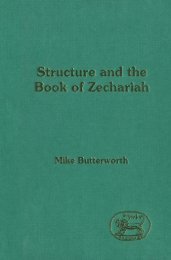Appendix CASE ONE - Collection Point® | The Total Digital Asset ...
Appendix CASE ONE - Collection Point® | The Total Digital Asset ...
Appendix CASE ONE - Collection Point® | The Total Digital Asset ...
You also want an ePaper? Increase the reach of your titles
YUMPU automatically turns print PDFs into web optimized ePapers that Google loves.
192 Legal History in the Making<br />
to it. 31 If anything they were sharpened by concern flowing from the apparent<br />
industrial progress and growing military power of Japan.<br />
Dealing with Japanese immigration at a legislative level was more difficult<br />
than in the case of the Chinese. Britain had signed a Treaty of Commerce and<br />
Navigation with Japan in 1894 which included provisions on free movement<br />
of subjects of both countries. 32 Although the treaty was not binding on white<br />
self-governing dominions without their accession, the British government was<br />
very concerned not to offend the Japanese whose country, in contrast to China,<br />
was seen as the rising power in the Far East. 33 When several Australian colonies<br />
and New Zealand in 1896 sought to extend their anti-Chinese immigration<br />
legislation to 'other Asians' the legislation was reserved for the consideration<br />
of London because of a possible conflict with imperial treaty obligations to<br />
Japan. 34 <strong>The</strong> British government was faced with the challenge of how to<br />
balance concern for Japanese sensibilities with the conflicting desires of settlers<br />
in the white dominions. It was Joseph Chamberlain, the Colonial Secretary<br />
in the Conservative government of the marquis of Salisbury who rose to the<br />
challenge. Chamberlain, the very quintessence of the high imperialism of the<br />
turn of the century, was a firm believer in the supremacy and civilizing mission<br />
of the British race and was committed to strengthening both the economic<br />
and military links between Britain and its dominions. 35 At the same time he<br />
recognized the importance to British interests of placating Japan.<br />
<strong>The</strong> solution to the immigration problem which he seized upon was readily<br />
at hand, recently devised by the legislature of Natal, one of Great Britain's<br />
South African colonies, to stem immigration from India. <strong>The</strong> white population<br />
of the colony, which had relied on indentured labour from India for many years,<br />
developed increasing antipathy to free Indian immigration, which together with<br />
the previously indentured population had produced virtual parity in the Indian<br />
and white populations by 1891. 36 <strong>The</strong> legal solution devised by the whites to<br />
cut off further Indian entry was the so-called Natal Act enacted in 1897, which<br />
applied a simple language test to all would-be immigrants. 37 <strong>The</strong> latter were<br />
required to fill out an application in 'a language of Europe'. It was correctly<br />
supposed that this would be beyond Indian immigrants whose mother tongues<br />
were 'non-European' and most of whom were illiterate in any event. From<br />
31<br />
Ward, op. cit., 97-98,102-103, 110-14; Roy, above n.3, 81-88.<br />
32<br />
L. Herslet, Herslet's Commercial Treaties, xix (1895), 691.<br />
33<br />
See W. Langer, <strong>The</strong> Diplomacy of Imperialism, 1890-1902 (New York, 1956), 460-61,<br />
472-73, 491, 680-83, 776-77.<br />
34<br />
Huttenback, op. cit., 156-62.<br />
35<br />
C. Brown and R. Cook, Canada, 1896-1921: A Nation Transformed (Toronto, 1974), 30-32.<br />
On Chamberlain's views on race, see W. Mock, '<strong>The</strong> Function of "Race" in Imperialist Ideologies: the<br />
Example of Joseph Chamberlain', National and Racialist Movements in Britain and Germany Before<br />
1914, P. Kennedy and A. Nicholls, ed. (1981), 190.<br />
36<br />
On the early history of the migration of indentured East Indians to Natal, see Huttenback, op. cit.,<br />
52-58.<br />
37<br />
Immigration Restriction Act, Stat. Natal, 1897, no.l, s. 3.






